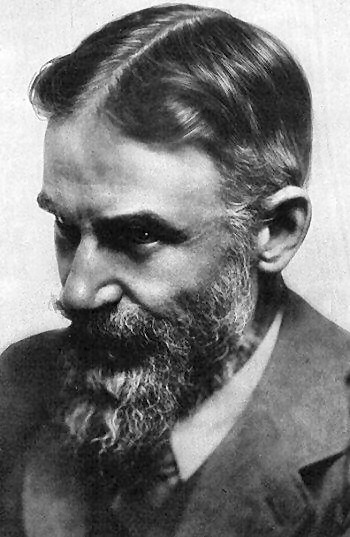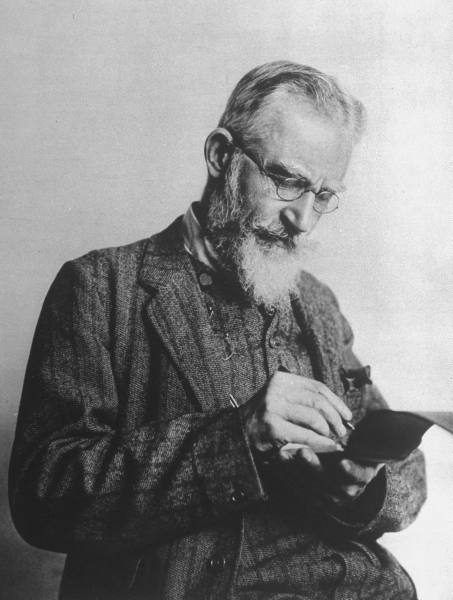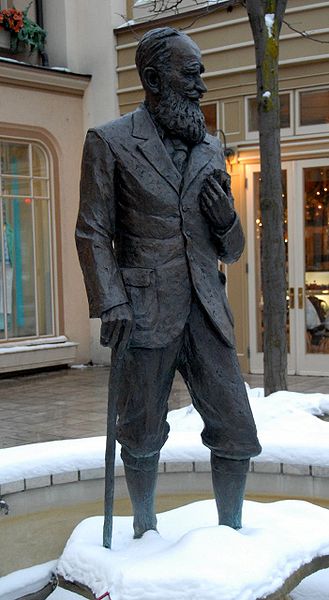<Back to Index>
- Psychiatrist Carl Gustav Jung, 1875
- Playwright George Bernard Shaw, 1856
- President of Mexico Mariano Arista, 1802



George Bernard Shaw (26 July 1856 – 2 November 1950) was an Irish playwright. Although his first profitable writing was music and literary criticism, in which capacity he wrote many highly articulate pieces of journalism, his main talent was for drama, and he wrote more than 60 plays. Nearly all his writings deal sternly with prevailing social problems, but have a vein of comedy to make their stark themes more palatable. Shaw examined education, marriage, religion, government, health care and class privilege.
He
was most angered by what he perceived as the exploitation of the
working class, and most of his writings censure that abuse. An ardent
socialist, Shaw wrote many brochures and speeches for the Fabian Society.
He
became
an
accomplished orator in the furtherance of its causes,
which included gaining equal rights for men and women, alleviating
abuses of the working class, rescinding private ownership of productive
land, and promoting healthy lifestyles. Shaw married Charlotte
Payne-Townshend, a fellow Fabian, whom he survived. They settled
in Ayot St.
Lawrence in a
house now called Shaw's Corner.
Shaw
died
there,
aged 94, from chronic problems exacerbated by injuries
he incurred by falling. He is the first person to have been awarded
both a Nobel Prize for
Literature (1925) and an Oscar (1938), for his
contributions to literature and for his work on the film Pygmalion (adaption of his play of the same name),
respectively.
Shaw
wanted
to refuse his Nobel Prize outright because he had no desire for
public honors, but accepted it at his wife's behest: she considered it
a tribute to Ireland. He did reject the monetary award, requesting it
be used to finance translation of Swedish books to English.
George
Bernard
Shaw
was
born in Synge Street, Dublin in 1856 to George Carr
Shaw (1814–85), an unsuccessful grain merchant and sometime civil
servant, and Lucinda Elizabeth Shaw, née Gurly (1830–1913), a
professional singer. He had two sisters, Lucinda Frances (1853–1920), a
singer of musical comedy and light opera, and Elinor Agnes (1855–76).
Shaw briefly attended the Wesleyan Connexional School, a grammar school
operated by the Methodist New
Connexion, before moving to a private school near Dalkey and
then transferring to Dublin's Central Model School. He ended his formal
education at the Dublin English Scientific and Commercial Day School.
He harbored a lifelong animosity toward schools and teachers, saying:
"Schools and schoolmasters, as we have them today, are not popular as
places of education and teachers, but rather prisons and turnkeys in
which children are kept to prevent them disturbing and chaperoning
their parents". In the astringent prologue to Cashel Byron's
Profession young
Byron's
educational
experience
is a fictionalized description of Shaw's
own schooldays. Later, he painstakingly detailed the reasons for his
aversion to formal education in his Treatise
on
Parents
and Children. In
brief,
he
considered the standardized curricula useless, deadening to
the spirit and stifling to the intellect. He particularly deplored the
use of corporal punishment, which was prevalent in his time.
When his
mother left home and followed her voice teacher, George Vandeleur Lee,
to London,
Shaw was almost sixteen years old. His sisters accompanied their mother but
Shaw remained in Dublin with his father, first as a reluctant pupil,
then as a clerk in an estate office. He worked efficiently, albeit
discontentedly, for several years. In
1876, Shaw joined his mother's London household. She, Vandeleur Lee,
and his sister Lucy, provided him with a pound a week while he
frequented public libraries and the British Museum reading
room where he studied earnestly and began writing novels. He earned his
allowance by ghostwriting Vandeleur Lee's music column, which appeared in the London Hornet.
His novels were rejected, however, so his literary earnings remained
negligible until 1885, when he became self-supporting as a critic of
the arts.
Influenced
by
his
reading, he became a dedicated Socialist and a charter member of the Fabian Society, a middle class organization
established in 1884 to promote the gradual spread of socialism by
peaceful means. In the course of his political
activities he met Charlotte
Payne-Townshend, an Irish heiress and fellow Fabian; they
married in 1898. In 1906 the Shaws moved into a house, now called Shaw's Corner,
in Ayot St.
Lawrence, a small village in Hertfordshire;
it
was
to
be their home for the remainder of their lives, although they
also maintained a residence at 29 Fitzroy Square in London. Shaw's
plays were first performed in the 1890s. By the end of the decade he
was an established playwright. He wrote sixty-three plays and his
output as novelist, critic, pamphleteer, essayist and private
correspondent was prodigious. He is known to have written more than
250,000 letters. Along with Fabian Society members Sidney Webb and Beatrice Webb and Graham Wallas,
Shaw
founded
the London School
of Economics and Political Science in 1895 with funding
provided by private philanthropy, including a bequest of £20,000
from Henry Hunt Hutchinson to the Fabian Society.
One
of
the libraries at the LSE is named in Shaw's honor; it contains
collections of his papers and photographs. During
his
latter
years,
Shaw enjoyed attending to the grounds at Shaw's
Corner. He died at the age of 94, of renal failure precipitated by
injuries incurred by falling while pruning a tree. His ashes, mixed with those of
his wife, were scattered along footpaths and around the statue of Saint
Joan in their garden.